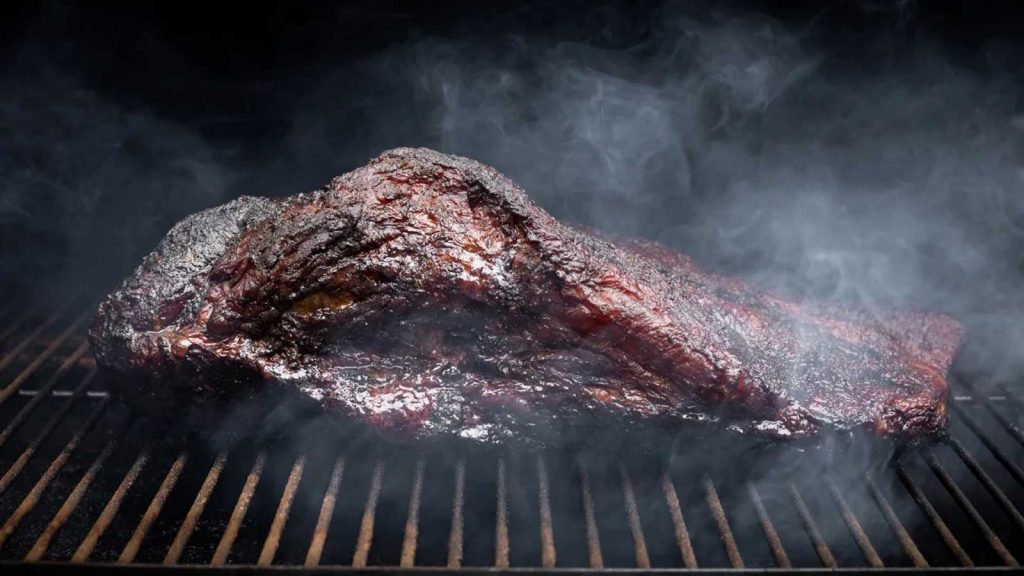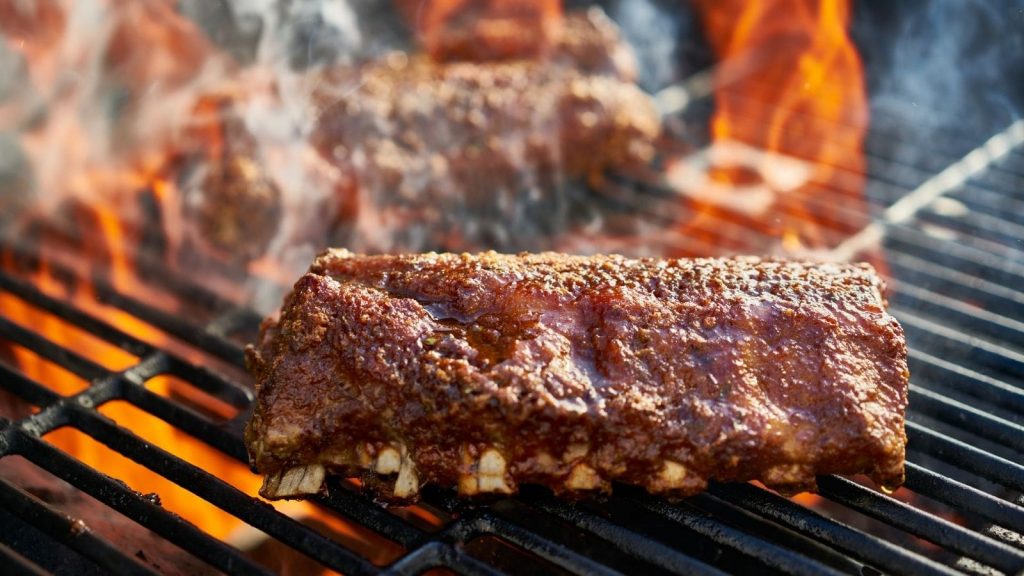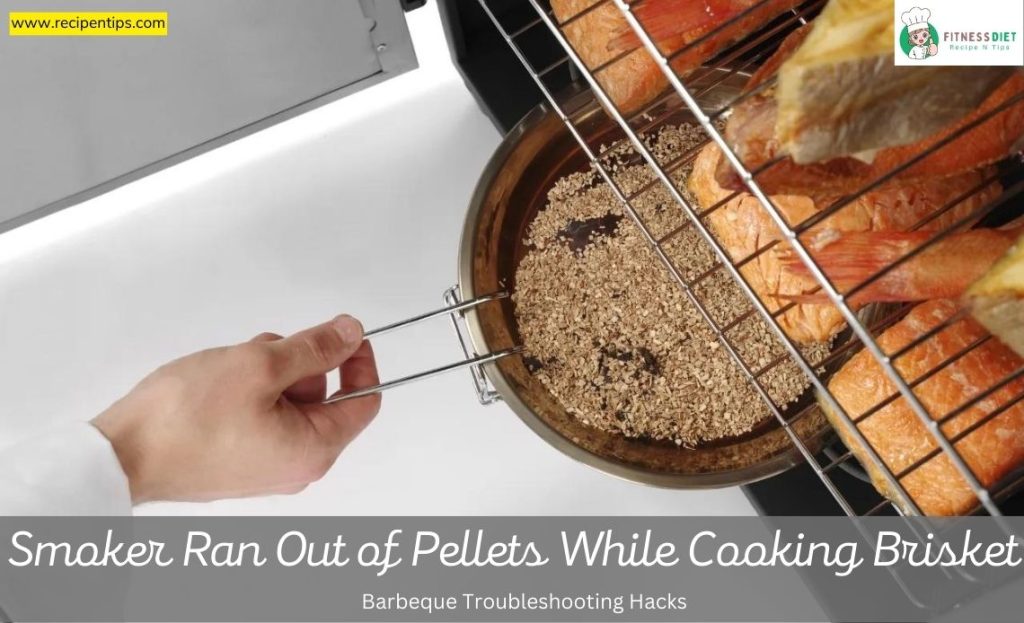Cooking a brisket can be a long and arduous process, so it can be incredibly disheartening when something goes wrong. Imagine the frustration of having to pause the cooking process because you’ve run out of pellets!
It happened recently to one lucky (or unlucky!) smoker who had their plans for a delicious brisket cut short by an unexpected pellet shortage. Here, we will have quick tips if you face the issue of smoker ran out of pellets while cooking brisket.
Smoking Brisket

Smoking brisket is a time-honored tradition that has been enjoyed for generations. This mouth-watering culinary experience requires patience and attention to detail to get the perfect smoky flavor, tender texture, and juicy meat.
With the right tools and techniques, you can find the solution if a smoker ran out of pellets while cooking. Anyone can smoke their brisket at home and enjoy restaurant-quality results every time.
Smoking a brisket can seem intimidating at first glance, but it’s quite simple when broken down into manageable steps. To begin, you’ll need to select a high-quality cut of beef with plenty of fat marbling throughout; this will ensure your finished product is moist and flavorful.
Next, use wood chips or chunks to create an optimal smoking environment; different types of wood produce varying levels of flavor, so experiment until you find one that suits your taste preferences.
Pellet Smokers for Barbecue
Barbecue is a beloved pastime for many Americans and those around the world. Recently, pellet smokers have become an increasingly popular option for barbecuing. Pellet smokers use compressed sawdust pellets as fuel to generate smoke and heat that can be used to cook food.
The main advantage of pellet smokers is their convenience. They are easy to set up, requiring the user to add pellets into the smoker’s hopper before turning it on with a simple switch or button. How to resolve the issue of the smoker ran out of pellets while cooking?
A variety of options are available when choosing the best pellet smoker for your barbecue needs. These include traditional barrel-shaped smokers, vertical models, electric models, portable units with temperature control systems, and a digital display panel for easy use.
Many models also offer additional features such as smoke generators, insulated cooking chambers, and integrated meat probes for monitoring internal temperatures.
Preventing Pellet Run-Out
Pellet run-out is a common issue for those who use pellet grills. This problem can be easily avoided by taking simple steps to ensure that the pellets are properly maintained. The following outlines the key causes of pellet run-out and how to prevent it.
The first cause of pellet run-out is clogged hoppers or augers, which prevent pellets from moving through your grill. To avoid this, remove unburned food debris from your hopper after each use and ensure it’s clean before adding fresh pellets.
Another cause could be faulty electronics, such as a lousy igniter or controller, which can interfere with fuel flow to your firepot. To address this issue, check all wiring connections and replace any faulty parts if necessary.
Staying Calm While Troubleshooting

When troubleshooting wood pellets during a cook, staying calm is essential. With the right approach and mindset, you can quickly find the root of the problem and address it efficiently.
Taking a few moments to pause and focus on your breathing can help you de-escalate any issues before they arise.
Start by assessing the issue at hand; are there any external variables causing an issue? Are there any potential mechanical or electrical malfunctions causing a problem with your pellet feed rate? Have you checked all connections and wiring thoroughly?
Having these questions answered ahead of time makes troubleshooting much easier when something goes wrong. Additionally, review your manufacturer’s user manual if needed; this will give you detailed information on identifying potential problems.
Resolving the Issue Quickly (Smoker Ran Out of Pellets While Cooking Brisket)
When it comes to resolving the issue quickly, one of the most common problems with smokers running out of pellets while cooking can be easily remedied. The first step is to remove the grates inside the smoker and check for any clumps blocking airflow.
If these blockages are present, they should be removed with a stiff wire brush or vacuum cleaner to allow better air circulation within the smoker. Once this has been done, you will need to fill up your pellet hopper and ensure that all pellets have been securely locked.
It will help ensure that your smoker continues to burn efficiently while cooking. The second step when resolving this issue quickly is checking your temperature gauge and ensuring it is accurate.
Enjoying Brisket
In conclusion, brisket is a delicious and versatile cut of meat that can be cooked in many different ways. From smoking to slow cooking in liquid to even microwaving, there is something for everyone when it comes to enjoying this delectable dish.
When done right, brisket can become the star of any gathering – so don’t miss out on the opportunity to make an incredible meal!
What to do if you run out of pellets mid smoke?
If you’re a grilling and smoking enthusiast, you know how frustrating it can be when your smoker runs out of mid-smoke pellets. But don’t panic! You can take some simple steps to get your grill or smoker back up and running and have your favorite dishes cooked to perfection in no time.
First, check the pellet burner’s hopper to ensure it contains enough fuel. If it’s empty, reload the hopper with fresh pellets. Ensure they’ve aged at least six weeks before use for better smoke flavor production.
Once the pellets are ready, restart the grill by turning off all burners and restarting them one at a time. Be sure to avoid sudden movements or jolts while starting, as these could disrupt airflow, leading to inconsistent cooking temperatures.
What happens if a pellet grill runs out of pellets?

If your pellet grill runs out of pellets, it can be an inconvenient and stressful experience. Pellet grills rely on the hopper’s pellets to provide cooking fuel; if there is no fuel, you won’t be able to use your grill. Fortunately, you can do a few things to ensure that your pellet grill stays running.
First, check the hopper for remaining pellets before firing up your grill each time. It will help ensure that there is enough fuel available for your cookout and allow you to plan accordingly if there need to be more pellets left in the hopper.
Additionally, it’s important to store extra pellets near or around the grills, so they’re easy to access when needed. Finally, check with local stores or online retailers regularly for new pellet shipments, so you never run out of fuel again!
What happens if my pit boss runs out of pellets while cooking?
Grilling season is upon us, and it can be challenging to keep up with all the necessary supplies when running a backyard barbecue. One of the most important items to have on hand is an ample amount of pellets for your pit boss grill. But what happens if you run out while cooking?
The first step in this situation is to turn off the grill immediately and refill the hopper. It’s important only to let your grills run with enough pellets, as they could overheat and cause damage.
Once you’ve replenished your supply, restart your grills at a lower temperature than before. It will help prevent further issues that may arise from lacking fuel.
Why is smoke coming out of my pellet hopper during cooking?
While cooking, smoke from the pellet hopper is a common problem many grillers face. In most cases, this smoke is caused by insufficient pellets in the hopper or too much ash buildup inside the auger tube.
To prevent this from happening, it’s important to open the pellet hopper regularly and check for any buildup of ash or clogs. If there appear to be too few pellets in the hopper, you can always add more according to your desired temperature.
Additionally, it’s recommended that you clean out the entire unit every few months—including all internal components such as fans and auger tubes—to ensure optimal performance and reduce smoke production.
Doing so will also help maintain your desired temperature during grilling sessions and enhance flavor for tastier meals!



